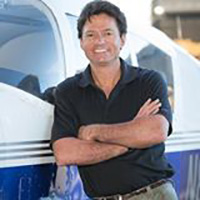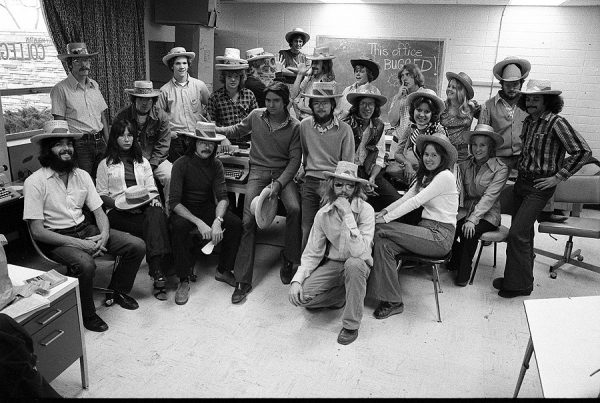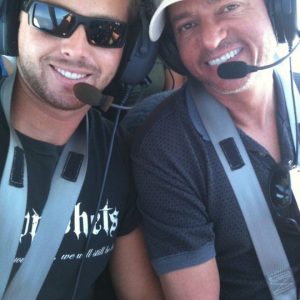“Journalism is vital to democracy. Journalism serves an essential function in our country and I felt privileged to be a part of that. Through my writing, I was able to make a difference in other people’s lives,” says David Freed (B.A. Technical Journalism, ’76), the 2018 College of Liberal Arts College Alumnus Award recipient.

As a print journalist, author, screenwriter, and now as a faculty member in the Department of Journalism and Media Communications, Freed has made a meaningful impact on the field of journalism and the lives of many.
During his freshman year at CSU, Freed quickly realized that he didn’t have a passion for his declared bioscience major. Looking for inspiration, he was flipping through the CSU course catalogue when he stumbled upon the technical journalism major. Recalling a high school English teacher, who saw promise in his work and encouraged him to consider a career in writing, Freed decided to give a journalism course a try.
It was in that first technical journalism course that Freed discovered his lifelong passion.
Eager to dive into the field, Freed worked on the Collegian staff, gaining confidence in his writing by covering local news stories. This strong foundation in the craft paved the way for positions post-graduation at the Colorado Springs Sun, Rocky Mountain News, and eventually, The Los Angeles Times.

“While at CSU, I learned the vocational skills to become a journalist, but more significantly, my liberal arts education opened my eyes to different schools of thought and introduced me to people from diverse backgrounds that I would not have normally been exposed to. It is through my liberal arts courses that I derived many of my core values,” shares Freed.
Much of Freed’s career in journalism was centered on telling stories of those who were often overlooked, which resulted in impacting many lives.
While at the Rocky Mountain News in Denver, Freed received a tip about hazardous working conditions in a steel plant in Pueblo, which caused injury and death for workers. He established contact with a factory worker, who helped disguise Freed as a fellow worker and smuggled him into the plant. Through his undercover tour, he gathered intelligence on the various safety violations and interviewed the workers impacted by this dangerous environment. Upon publishing a series of exposés, the steel plant was put under investigation.
Years later, Freed received an email: the factory worker who enabled him to go undercover wanted to share his gratitude. Thanks to his stories, the plant made many changes, the state came in and cleaned up the issues, and Freed had ultimately saved many other factory workers from a dire fate.
“Most of the time you don’t realize the end result of your work,” explains Freed. “It means so much to know that something I wrote was able to make an impact in someone else’s life.”
While at The Los Angeles Times, he was sent to the Middle East to cover the First Gulf War. During this time, Freed interviewed Iraqi Shiite Muslim refugees fleeing from dangerous circumstances. This impoverished group was living in constant fear without aid. He gave voice to their stories and was moved by how gracious and hospitable the people were, offering him tea and pastries while he gathered their stories.
“CSU introduced me to people from all walks of life. Later, as a reporter, I traveled the world and met amazing people. What I learned was that everyone is the same – we have the same DNA, same needs and desires, and the same motivations. I learned that lesson at CSU first,” explains Freed. “I realized that you can’t interact with people from different parts of the world and not see yourself in them.”
During his time as a reporter for The Los Angeles Times, Freed shared in a team Pulitzer Prize for reporting on the Los Angeles Rodney King riots and was an individual finalist for the Pulitzer Gold Medal for Public Service, the highest award in American journalism. Upon returning from the Middle East, Freed was ready to take his career in a different direction. Thanks to the large readership of The Los Angeles Times, Freed had been frequently contacted by producers interested in turning his news stories into TV and movie productions.

In the ensuing years, Freed authored more than a dozen feature-length film scripts and even worked with the Central Intelligence Agency and Defense Intelligence Agency, writing multiple complex interactive computerized training simulations. An avid pilot, he is also a contributing editor to Air & Space Smithsonian and has published a series of critically acclaimed mystery novels featuring a flight instructor.
In 2012, Freed joined the Department of Journalism and Media Communication as an instructor, using more than 30 years of experience as a writer to make an impact on the next generation of journalists.
“The culture that exists at CSU is to provide a springboard for our students – that is my job here. I encourage my students to pursue what they are passionate about. I share with my students that communication skills are universal, transferable, and applicable to every endeavor. If you can communicate and construct a cogent paragraph, you can write your own ticket anywhere you want to go,” says Freed.
Freed’s impact on the Department of Journalism and Media Communication students extends far beyond the classroom. Along with his wife, Betsy, who had an equally accomplished career in medical writing, the Freeds established A Vital Press: The CSU National Beacon of Truth Forum through an estate gift. The forum will bring the nation’s leading, award-winning journalists to CSU’s campus as guest speakers.
A Vital Press aims to encourage discussion about the integral role the First Amendment and news media play in democracy. The Freeds believe fervently in the public’s constitutional right to know, and in the difficult work of journalists, who are tasked with holding public figures accountable, particularly in times of political partisanship. Honoring David’s work in the field, this fund aims to further CSU’s commitment to these ideals.
“Success, especially in journalism, isn’t about finances or acquisition of wealth. It is about being a good person and trying to help other people,” shares Freed.
Through A Vital Press: The CSU National Beacon of Truth Forum, the Freeds will be able to share this valuable lesson with the next generation of journalism students.